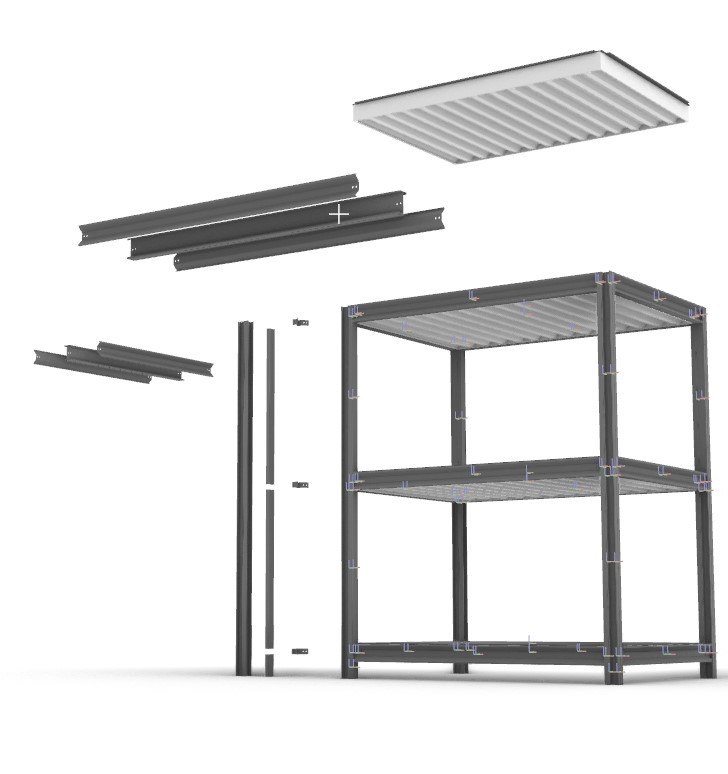
The United States has long been struggling with a significant housing shortage, and it doesn't seem to be on a path to slow down in the future. The estimated housing shortage is expected to reach 8 million units in the next few years. This will affect millions of Americans, as many already struggle to afford their own homes. The current shortage is ~ 5 million units.
Between rising costs, labor shortages, and outdated construction practices, cities are particularly contending with increasing numbers of unhoused individuals. En-Habit is developing a solution that hinges on sustainability, affordability, custom-designed, easily modified, and delivered in one month, to combat these issues. Ease of modification supports "incrementally upgradable." This is crucial to responding to immediate needs. Adjusting to circumstance is 21st-century thinking. "Reusable," "Doesn't easily light on fire," and "Sustainable" are as well.
Approaching the Housing Shortage Differently
En-Habit believes that housing should reflect more than how people live; it should also focus on resiliency, efficiency, and adaptability (that includes user specification) when it comes to the needs of modern life. Experienced architect Joseph Jenkins founded the company, utilizing his decades of humanitarian and global experience to help shape the company into what it is today.
Jenkins established En-Habit to fill the housing gap, which is particularly affected by natural disasters, whether it's Banda Aceh recovering from a tsunami or Haitians rebuilding after earthquakes. En-Habit is all about ensuring that houses will be built faster and smarter, all while using dignified user-centered designs.
From there, the business model will incorporate advanced AI, sustainable materials, and panelized skeletal frame manufacturing to reform how homes will be planned and built.
Mass Customization Done Differently
En-Habit has unique ways to counteract run-of-the-mill, slow, laborious housing. By using AI-driven laminated panel manufacturing with a clip-together frame, En-Habit can amp up housing production without compromising the flexibility of the designs.
So, what makes En-Habit different? The system could produce as many as 16 homes monthly, centered on each client's vision. The clients customize each house through a game controller digital interface. Of course, this makes design and production faster and easier, allowing homeowners to take control of the final product and create a home they'll love with a familiar, easily understood game controller. They can take as much time as they want. They will choose appointments and appliances inside the digital environment displayed in 3 dimensions, either installed by us, as in lighting, or delivered by the participating vendor of their choice. We install all utilities. The data collected is very useful, especially for expansion.
Using Better Materials
Simplicity, resilience, and sustainability are the name of the En-Habit game, with structural frames made of EAF processed cold-rolled galvanized strip steel. These materials are stronger and lighter than hot steel, with the bonus of being sourced from 100% scrap metal.
The panel section is also unique in that it is a lamination of fireproof FOAMGLAS® blocks enclosing a monolithic impermeable high R-value core of recycled soda bottle PET foam to get the job done. The ignitable, otherwise high-performing PET is never exposed and always protected. These materials are non-toxic, energy-efficient, and help to reduce costs in the long run while contributing to a healthier environment. Recyclable, long-lasting PET, recovered from the environment, and put somewhere useful.
The best part? They're resistant to damage and built to last.
Regarding manufacturing, En-Habit homes will be fabricated off-site to deliver fully and quickly assembled houses in just one month, sidestepping common delays and inefficiencies that future homeowners often experience. "AI and robotics will make us even better and more affordable in the future. The objective is to sustainably close the 8 million household housing gap, full stop," says Jenkins.
Looking Toward the Future
En-Habit may be a housing company, but the mission goes beyond building and delivering homes. These houses are being designed to directly respond to a generational crisis that is getting more complex. Sustainability, minimal waste geometries and methods, and more affordable long-lasting homes are the name of the game, all while letting customers into the driver's seat of the design process. We will be leaders in AI and robotics in construction. Welcome to the future of 21st-century housing.
Originally published on vcpost.com



